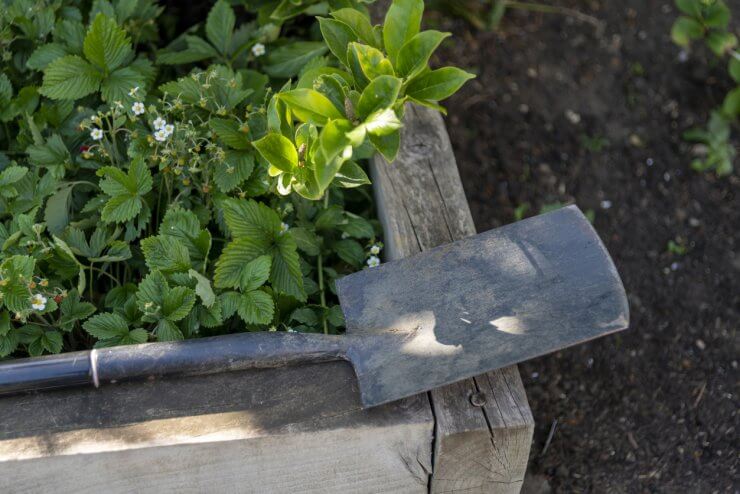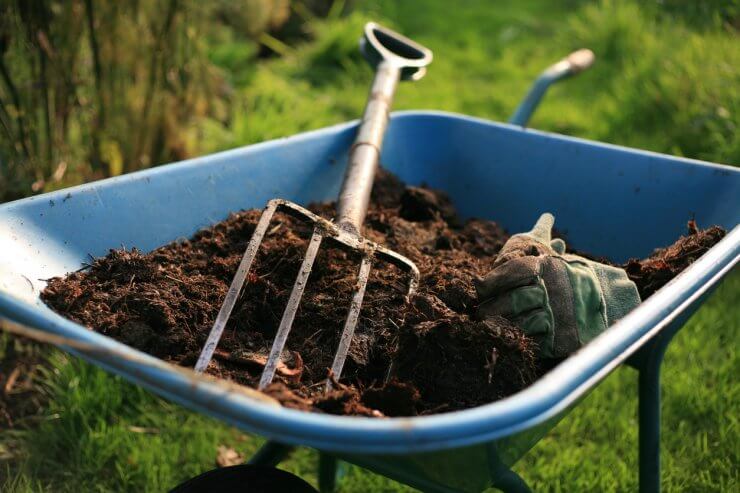
The great thing about compost is that… wait. Forget that. Everything is great about compost. It’s a great way to reduce the amount of garbage that goes to the landfill. It’s an incredibly healthy addition to your soil. And you don’t need any special equipment to compost. Of course, I’ve been gardening for a while, but when I first started, even though I knew compost was good, I didn’t really know how to use compost.
I had a small bucket of compost and just sort of spread it out on top of the soil around some herbs. Little did I know that compost also works wonderfully as a mulch! My herbs were fantastic that year! Hey, sometimes we get good garden results just from sheer luck.
You can, however, be a lot more strategic than that. Compost offers a lot of benefits that are easy to take advantage of.
Discover 7 top tips for growing, harvesting, and enjoying tomatoes from your home garden—when you access the FREE guide The Best Way to Grow Tomatoes, right now!

How to use compost: 5 ways to get the best vegetable garden ever
1. Mulch: Using mulch? Good. Using compost? Good. Using compost as mulch? Dang! That’s a fine garden happening! In all seriousness, compost is like mulch on super-vitamins. You get the moisture retention and soil warmth that mulch provides, plus the nutrient boost that compost brings. The nice thing is that you aren’t on a specific timeline for this. You can add the compost when your seedlings are just coming up or when the plants are more mature. There are benefits to be had either way.
2. Soil amendment: Wondering how to use compost to improve your soil before you plant? Mix an inch or two of mature compost into your garden soil in early spring before you start your vegetables outdoors. Compost contains microorganisms and nutrients that your plants thrive on. And Washington State University points out that compost can help protect plants from diseases.
3. Fertilize your fruit trees: Most fruit trees like an extra nutritional boost before producing fruit (aka in the spring). Just rake the compost into the soil around your tree. I should add a couple of quick notes here. Not every fruit tree needs fertilization each year. Check out the specifics for your tree before you get started. Additionally, don’t fertilize fruit trees in the late summer or fall when they’re getting ready to go dormant for the winter.
4. Use it to grow the best squash ever. Squash like a lot of nitrogen, which is precisely what compost offers. I’ve seen pumpkins and butternut squash grow directly out of a compost heap. So if you’re wondering how to use compost when you only have a little bit, and you love squash, well, here you go.
5. Make compost tea. Just don’t drink it yourself. I assure you it won’t be very enjoyable. Your garden, on the other hand, will (maybe) love it. Why maybe? You can read more about compost tea here, but the short version is that it’s a bit controversial. While some gardeners swear by it, some horticulturalists believe it can be detrimental to your plants or even to you. So why do we include it? If, for some reason, you find that you have excess compost, you could always make compost tea to water your lawn or non-vegetable garden plants and flowers. In thinking about how to use compost, this wouldn’t be my first choice, but it’s always good to have options.
What’s your compost story? How do you use compost in your garden?
Discover 7 top tips for growing, harvesting, and enjoying tomatoes from your home garden—when you access the FREE guide The Best Way to Grow Tomatoes, right now!




